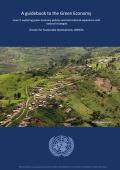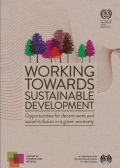This report addresses two of the defining challenges of the twenty-first century: achieving environmental sustainability and turning the vision of decent work for all into a reality. It shows that not only are both challenges urgent, but they are also intimately linked and will have to be addressed together. While it is certain that environmental degradation and climate change will increasingly require enterprises and labour markets to react and adjust, the goal of environmentally sustainable economies will not be attained without the active contribution of the world of work.
This volume examines the experiences of 21 developed and developing countries in adjusting their training provision to meet the new demands of a greener economy. Analysts started by identifying the drivers of transformation to a greener economy – changes in the physical environment itself and changes induced by government regulations, more efficient technologies and changes in consumer demand. Then they assessed the effect of these changes on employment, identifying areas of job growth and of job loss
Only then could researchers start to understand how skill requirements are changing and are expected to change in the future, and to examine how well national training systems are anticipating and responding to these new needs. Their analysis shows that skills development is critical to unlocking the employment potential of green growth, yet skills shortages are becoming an obstacle in realising this potential. The report recommends that countries devise strategies based on well-informed policy decisions, social dialogue, and coordination among ministries and between employers and training providers.
Sustained growth in Brazil, China, India, Indonesia and South Africa will be critical for the global economy in the coming decades. This volume, based on the proceedings of a conference organised by the Economics Department of the OECD on 24 September 2009, analyses growth performance in these five emerging market economies and the prospects for sustaining strong growth over the longer term. Drawing on contributions from distinguished policymakers and scholars, the volume discusses the specific drivers of growth in each of the five countries with which the OECD has had a programme of Enhanced Engagement since May 2007.

Green economy in the context of sustainable development and poverty eradication was one of two themes at the UN Conference on Sustainable Development held in Rio de Janeiro in June 2012 (or Rio+20).
Negotiations on green economy in the lead up to Rio+20 were challenging and the concept became a source of controversy and disagreement. Despite these challenges, governments agreed at Rio+20 to frame the green economy as an important tool for sustainable development; one that is inclusive and can drive economic growth, employment, and poverty eradication, whilst maintaining the healthy functioning of the Earth’s ecosystems. Importantly, the outcome document also recognises that capacity building, information exchange and experience sharing will be critical for implementing green economy policies. In this context, the document invites the UN to work with partners to provide support to developing countries and to develop toolboxes, best practices, methodologies and models to aid green economy policy design and implementation.

This joint study by the International Labour Organisation (ILO) and the United Nations Environment Programme (UNEP) highlights that the transformation to a greener economy could generate 15 to 60 million additional jobs globally over the next two decades and lift tens of millions of workers out of poverty. The report documents evidence that for countries at all levels of development the drive towards environmental sustainability and greener economies is gaining momentum. The study indicates that job growth has been particularly strong in the renewable energy sector, with a global increase of 21 per cent per annum. As a result, the sector now employs close to 5 million workers; more than double the number employed only a few years ago.
This summary was prepared by Eldis.
